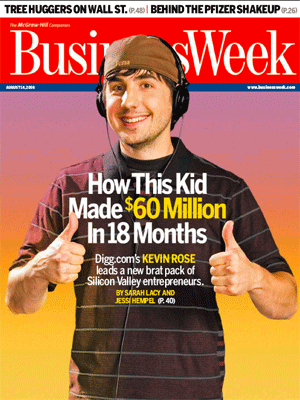
Late last night I clicked on a link to the new Business Week cover story about Digg and its founder, Kevin Rose, and read the cover’s headline: “How this kid made $60 million in 18 months.” Gee, I thought, bleary-eyed, I guess I missed the story about how they sold the company. Good for them.
This morning I started reading the piece, and, after scanning quickly through it hunting for the graph about how Digg had sold out and to whom, realized that the $60 million figure was not the proceeds from a sale, and not even a valuation that a prospective buyer had offered, but an almost entirely fictional number.
Was it something that some irresponsible coverline writer had slapped on the piece, that the responsible writer was horrified to see? I don’t think so. The second paragraph of the article, referring to a recent redesign of the Digg site, reads: “At 29, Rose was on his way either to a cool $60 million or to total failure.”
The $60 million number is never explained in the piece; the only real numbers are contained in this sentence: “So far, Digg is breaking even on an estimated $3 million annually in revenues. Nonetheless, people in the know say Digg is easily worth $200 million.” Elsewhere the article says Rose owns 30 to 40 percent of the company. Hence, $60 million.
There is a word for this kind of business journalism, and it is: awful. The reader has no idea who these “people in the know” are; they could easily be people associated with the company who have an interest in inflating its worth.
There’s no question that Digg is a successful site that might be on its way to building a real business. It might be worth more than $200 million someday. I’m not slighting them in any way; I’ve been visiting the site almost since it started. But plastering imaginary dollar figures on its forehead is not the way to help Rose and his colleagues build a real business. “On paper” means just that. “People in the know” can say whatever they want, but your business, like your house, is only worth what someone is actually willing to pay for it.
The Business Week piece itself acknowledges this in places: “This time around, the entrepreneurs worry that, within a moment, the money — and their projects — could vanish… it’s still only paper wealth, which [Rose] and many others have learned can evaporate.”
Right. So why is Business Week insisting that Rose has made $60 million? If this callow 29-year-old understand that it’s “only paper,” why are the editors of one of our best-known business journals being so stupid about it?
Techdirt calls the article “the ultimate Web 2.0 hype piece,” but I think it’s not even that up to date; it’s the same old dotcom-bubble piece dragged from the attic and retrofitted for today’s Web. It is just as mindless about the nature and meaning of company valuations as the dumbest purchaser of TheGlobe.com IPO shares was.
POSTSCRIPT: Jason Fried of 37Signals comes at Business Week from the perspective of a successful entrepreneur who is also a member of the tech industry’s reality-based community.
[tags]digg, web2.0, bubble[/tags]
Post Revisions:
There are no revisions for this post.
